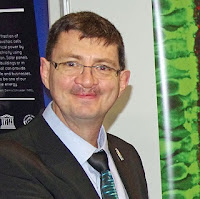In preparation for the first International Day of Light, we asked members of the SPIE community to explain why they feel light is so important. We will feature their answers throughout the coming months as we get ready to celebrate the first IDL.
The inaugural International Day of Light – IDL – will take place 16 May 2018. IDL is a global initiative that provides an annual focal point for the continued appreciation of light. This day recognizes light and the vital role it plays in science, culture and art, education, and sustainable development.
On 16 May, join SPIE and communities worldwide by participating in activities that illustrate how the science and art of light improves all our lives. For more information and to plan your own event, visit
spie.org/IDL.

Meet SPIE Member
John Dudley,
Steering Committee Chair of IDL 2018
What about light inspires you?
I am fascinated by the properties of light and how it is so central to all areas of science. Space and time in the universe are coupled by the speed of light, we understand so much of physics by studying how light interacts with matter, and life itself wouldn’t be possible without the energy that comes from sunlight to drive photosynthesis. If one looks at the history of science, so many of the major advances have been made because of developments in our understanding of the properties of light and how to manipulate it. The development of optical instrumentation allowed Galileo and Newton to revolutionize our understanding of the solar system, Maxwell was able to link electricity and magnetism through a unified theory of light as an electromagnetic wave, and it was through trying to understand the seemingly simple property of the spectrum of light from a hot object that led to the development of the quantum theory! And it seems that so many recent Nobel Prizes have used light as an essential tool – even the measurement of gravitational waves used an interferometer based on lasers. Light is full of surprises!
How can light help overcome a current global challenge?
There are many areas of concern right now for our planet. We have to urgently develop intelligent ways to address climate change, and the use of light-based technologies is obviously a major component of any solution, whether it be solar power or more energy-efficient lighting in homes and cities. Moreover, both these areas are also linked to the major societal challenge to improve education and reduce poverty worldwide. It has been inspiring to see how the optics and photonics community has embraced the recent UN and UNESCO initiatives of the International Year and Day of Light to learn about these challenges and to work to find solutions.
What do you do to share your passion for light?
I am passionate about both research and education, and I try to take every chance I can to educate people about the wonders of light! Of course, I give regular courses at the university where I teach, but what I really like to do is to give popular science lectures to high schools and the public to show them through experiments the many beautiful manifestations of light and how we can use it in technology and in society. Talking about light is an immediately visual and accessible way to get people of all backgrounds interested in science in general, and opens the door to all sorts of conversations about the future of society and how we can best work together to improve quality of life for everyone. I have been very lucky to be able to work with international organizations like SPIE who have provided the backing and support to allow me to be able to promote my excitement about light to a worldwide audience.




Comments
Post a Comment